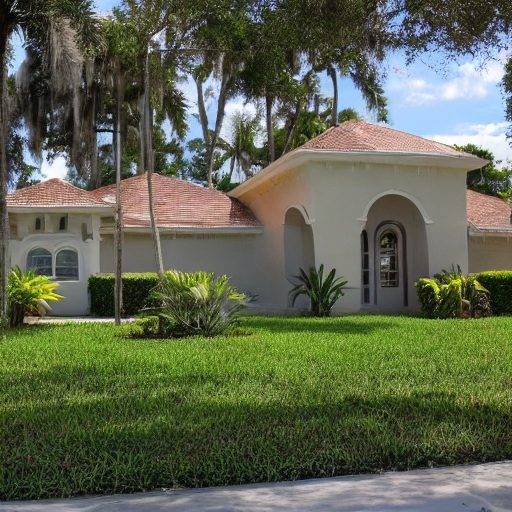
Get the Best Results with Richr: The Top Discount Real Estate Broker in Florida
Are you looking to buy or sell a property, but…
February 2, 2023
HOA fees are used to cover the maintenance of public spaces and for certain services and amenities made available to members.
Table of Contents:
Why you shouldn’t buy a house with HOA
What are the benefits of having an HOA?
Can HOA regulate your backyard?
Are HOA fees included in Mortgage?
What are some downsides to HOAs?
Can an HOA prevent me from selling my house?
Are homeowners’ association fees tax deductible?
HOA fees are fees paid by property, or homeowners, to the homeowners’ association of their district. Typically, these payments are made monthly and what they cover will vary based on the location that the home is in. It’s important to note that not all homes belong to an HOA, therefore when purchasing a property, it’s worth looking into whether the property you’re purchasing is connected to an HOA.
Your local HOA is a governing body that works in the common interest of the community that it’s based in. Normally, they are run by members of the HOA, that is residents and homeowners in the area. As they are governing bodies, they also follow a sort of organizational structure which includes a board of directors. The board’s responsibility is establishing the budget for the HOA and maintaining and enforcing the rules and regulations that were previously decided on. The HOA rules are legally enforceable in most areas so for those whose homes belong to an HOA you may find you’re obliged to follow a set of rules based on the conditions set by the HOA.
In general, the HOA rules tend to dictate aspects relating to the exterior of the home. This could mean that they have certain rules regarding garden care or trash disposal. In cases where the HOA is for apartments, the rules that they enforce could include forbidding smokers from smoking inside or dictating the pets allowed in the building. Overall, the rules set out by the HOA tend to have positive effects on property values as they can ensure that the entire area is relatively uniform and well-cared for.
The answer to whether HOA fees are worth it will greatly vary based on the area that you’re in. In most areas because HOA’s help maintain your property’s value, they are beneficial, as such, the fees associated with them can be considered worth it. In less populated areas it’s, or in cases where the HOA fees cover things that you’re not interested in taking advantage of then the fees for the HOA may seem excessive and not worth it.
While having your home be part of an HOA can come with a set of benefits, some negatives can be associated with it as well. When first buying a house the biggest one of these is that usually, the HOA requires an upfront payment for your membership. When adding this to all the other closing and moving costs one needs to pay for the purchase of a new home it becomes fairly obvious that purchasing a home that isn’t part of an HOA may be more cost-effective.
Another reason why many people prefer to own properties not associated with an HOA is that they are not interested in having an association dictate certain aspects of how they run their lives and properties. While the HOA rules and regulations can help your property retain its value it’s also possible that the rules you need to abide by may not work for you. In those cases, it’s best to choose a home that does not belong to an HOA.
HOA’s come with benefits, if they didn’t, no homeowner would agree to paying their high fees and abiding by their rules and regulations. These benefits include:
1. Property Value Maintenance
2. Connections with the Community
3. Rules and Regulations that keep the peace in the neighborhood
4. Maintenance of common areas and amenities
5. Access to community areas and amenities
If in the community in which you live in there is an already established HOA and you were a part of it then opting-out isn’t an option. If there is no HOA in your area and one is beginning to be established you may find that you’re able to refuse to join, but all of that will depend on the area you’re in and the conditions already in place by the HOA.
For the running of the HOA and for the maintenance of the amenities, services, and areas the HOA is responsible for you’ll need to pay certain dues or fees. The amount of those will greatly vary depending on the area you’re in. Typically, the HOA fees are paid monthly by the homeowners who belong to the association.
HOA fees are there to cover the costs of maintaining the community areas and amenities provided through the HOA. In many cases the HOA fees may cover the following:
In the case where the property the HOA fees relate to is a rental property, you’ll be able to completely write off the HOA fees, as they are tax-deductible. The percentage you’re able to write off depends on the usage of your property. For example, if the property is exclusively used as a rental property, then you’ll be able to write off 100% of your HOA fees. If you’re only using the property as a rental for part of the year, then the amount you can write off will need to be of an equal percentage to the percentage of time in the year that the property is used as a rental property.
The short answer to this question is yes, but it’s important to remember that this is only true regarding certain rules and regulations set out by the HOA. For example, it’s possible that in your area the HOA organization can dictate the color of your siding or fencing, or they could make it so you’re not allowed to add a storage shed in your backyard. Depending on your area the regulations and limitations on what you can do in your backyard may increase so it’s always best to check with your HOA before making any expensive alterations to your backyard.
Whether you consider HOA’s bad or good is truly a matter of perspective. While for some people the fact that they restrict you from doing certain things within your property or to your property may be a deal-breaker, for others the positive associated with the HOA far outweigh those ‘bad elements’ of the associations. Different HOA’s are also less or stricter so when buying a new house, you may want to consider which aspects the HOA will regulate regarding your property.
HOA fees are not included in your mortgage, instead, they are paid directly to the homeowner’s association. If you’re just purchasing a house, you’ll be required to make an initial payment to the HOA for your membership to the association. That amount is part of the closing costs you’ll need to pay to close on the house and they are not usually rolled into the mortgage.
Some of the most common downsides associated with HOA’s include:
1. HOA fees: the HOA fees in some areas can be quite high which is a huge deterrent for new homeowners looking to purchase a home.
2. HOA Rules and regulations: if the rules and regulations of the HOA do not fit your lifestyle you may find that you’re struggling to keep up with the rules that they have put up.
HOA fees normally only go up annually. Those readjustments to the fees are made so that the future labor, utility, and maintenance costs associated with the community will get covered. Normally, there are estimations regarding the amount the HOA needs and it’s based on those estimations that the HOA fees get determined.
Typically, HOA rules are concerned with maintaining the public appearance of the properties that belong to the association. They also are put in place to minimize and disturbances in the area. The most typical of these rules include:
· Restrictions on the lawn and outer home decorations
· Home maintenance standards
· Policies to deter nuisance and noise complaints
· Limits on how many occupants can be in one property
· Parking rules
· Limitations on pets
· Limitations on short-term rental restrictions
The HOA can prevent you from selling your house if there are outstanding contributions to the HOA that haven’t been paid. While this is the most common reason for the HOA to stop a sale, it does not mean it’s the only reason. Depending on the rules and the regulations of the HOA your home belongs to you may find that the association is trying to stop the sale of your property from going through. If they are doing so without a good reason, then as a homeowner you’re able to sue the HOA for damages if they stop the sale of your home.
Lowering the HOA fees isn’t something that can be done on an individual level, but with some planning and organization, you may be able to overall lower the HOA fees for your association. To do so you’ll want to look through the HOA budgets and determine whether,
1. The contracts they have with vendors and services are reasonable or if they could be reduced
2. Assessing whether the reserve fund for your HOA is large enough where it may be warranted to use those funds instead of raising the HOA fees
3. Increasing the timeline for the completion of nonessential repairs to lower the monthly amount to be paid for the HOA fees.
Normally, if there are two HOA fees you need to cover then that would mean that apart from your regular HOA you also belong to a ‘master HOA’. The first one is more local, for example, it could only be for residents in your building, the second one covers a much larger area. In this area, they may be responsible for the roads, road lights, and other communal amenities available. As a member of the HOA, you’ll need to pay dues to both of these associations.
If the house in question is a rental property, then the HOA fees associated with that property can be tax-deductible. Depending on the proportion of the year that the property is rented for you’ll be able to reduce and deduct a proportionate amount from your taxes.
HOA fees are not usually negotiable, instead, they are the same for all the community members that belong to the HOA. This is because the budget required by the HOA needs to be covered equally by all residents. For this reason, the fees can’t be altered based on circumstance.
Having an HOA in place can lead to your property retaining its value better. It can also help create a better environment within your community. Still, the high fees of the HOA can act as a deterrent for those who do not wish to have someone regulating their actions in their own home and then having to pay them for those regulations.
If you’re looking to buy or sell a house and would like to discuss your option, Richr can help you!
Our fully licensed Concierge Team is here to answer questions and provide free, objective advice on how to get the best outcome with your sale or purchase.

If you want the Richr team to help you save thousands on your home just book a call.
 Book a call
Book a call